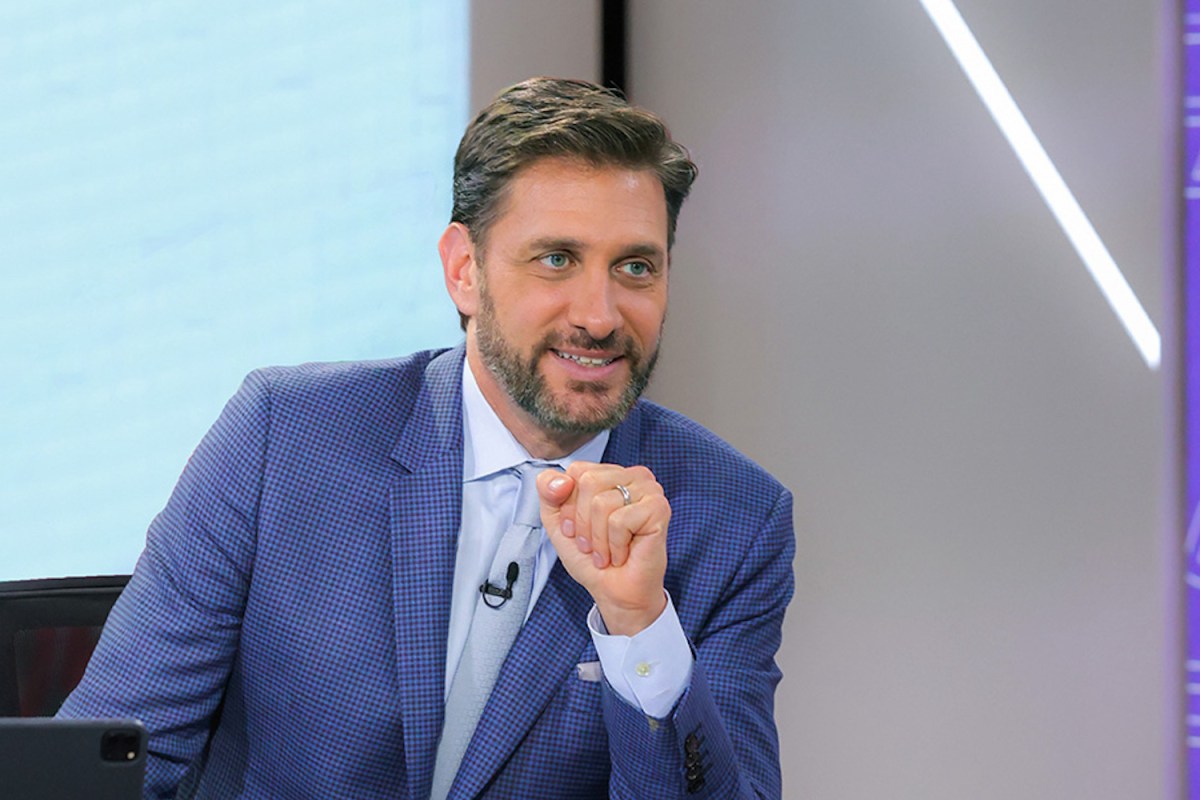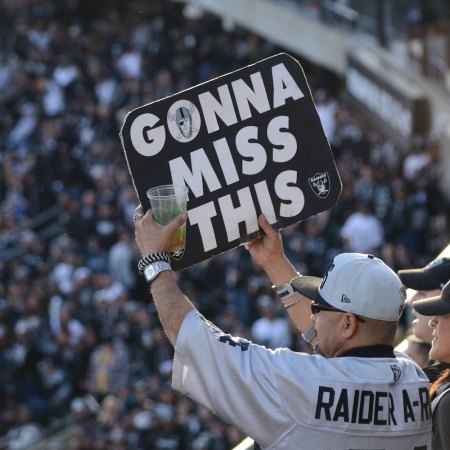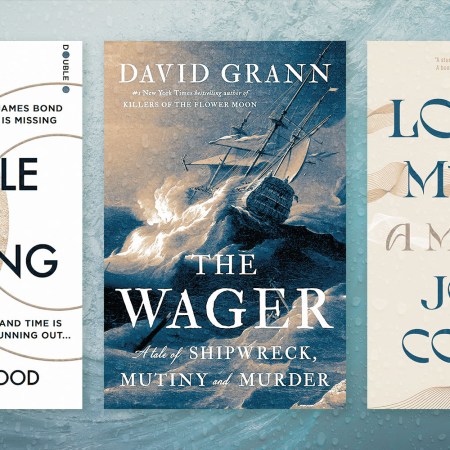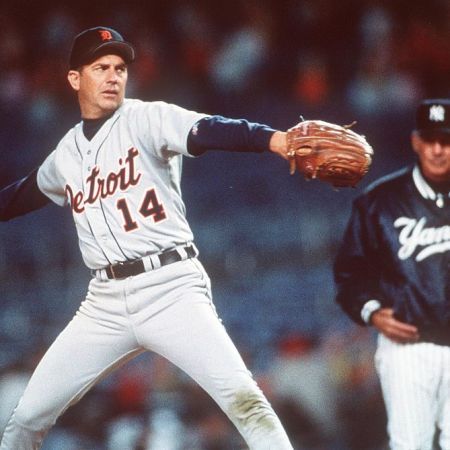Among the undisputed best things about being a sports fan is the license it gives us to engage in arguments. From current considerations — Who should be the right-handed designated hitter for the New York Mets this year? — to historical analysis — Who’s on the NBA’s Mount Rushmore of All-Time Greatest Players? — there’s no end to the possibilities for debate within the category.
Paradoxically, it’s these minor verbal conflicts that actually bring sports enthusiasts together. And in another ironic twist, even though most sports arguments are never really “won” because they’re so often started over differences in subjective opinions, the foundational element of any good debate in sports is hard numbers, etched in stone, that can’t be changed.
That’s why longtime ESPN personality Mike Greenberg, whose entire life’s work has been devoted to establishing and backing up takes of his own, wrote a book about sports arguments focused completely on numbers. Got Your Number: The Greatest Sports Legends and the Numbers They Own is a series of quick-hit chapters, numbered one to 100, throughout which Greenberg starts and ostensibly ends an argument about who is most closely associated in sports fans’ minds with each individual figure.
Co-authored by Paul “Hembo” Hembekides — content producer of Get Up, the ESPN show hosted by Greenberg — the book’s available for purchase starting today, April 4, 2023. InsideHook chatted with Greenberg about how the book came together, some of the more challenging arguments he had to make in it, as well as other current sports-related concerns.
It was all fairly civil.
This interview has been edited for context.
InsideHook: Tell me about your new book’s concept and how it came about.
Mike Greenberg: I was sitting around with a bunch of people who work on Get Up, and we made the observation that a great number of Hall of Fame quarterbacks all wore the number 12: Joe Namath, Jim Kelly, Roger Staubach, Terry Bradshaw, Bob Griese and, now, Tom Brady and Aaron Rodgers, both of whom will clearly be in the Hall of Fame. Someone in the room said, “Yeah, they all wore number 12, but who owns number 12?” And literally in that moment a light bulb went off over my head. I always wanted to write a sports book, but I never had an idea that I thought was interesting enough. But for this idea, I called my agent and I said, “Do you think this is a good idea?” He said, “I do,” and the next thing I know, here we are.
You do get a little creative, though. Some of the folks that own certain numbers in your estimation do so without them being their uniform numbers.
Paul Hembekides has been doing my stats for about 10 years, so I brought him in on the project early and we started putting together lists. What we quickly realized was, if we were going to restrict it to uniform numbers, then that meant we were going to do a sports book about the greatest legends and athletes in sports history without Tiger Woods or Serena Williams or Muhammed Ali in it. We started seeking creative ways to do it and we realized that if you just limited it to who was the greatest player ever to wear — and I’m just going to throw a number out there; this is not meant to insult anyone specific — the number 27, then you might have someone in the book who doesn’t belong ahead of people like Muhammed Ali, Tiger Woods, Jack Nicklaus, Billie Jean King or Serena Williams. We came up with what I thought were smart, creative ways of using the numbers — such as years and records — so that we legitimately were able to fill the book with 100 true legendary figures.
The book’s structure really compels the reader forward because it has short chapters with the numbers counting up. As you were developing the book, did you think that element would help keep readers interested and give them the opportunity to play a guessing game with themselves about who you might choose for each number?
The second one, definitely. That’s why there’s no table of contents. We made a conscious decision not to list at the beginning who they all were going to be. Some of them I think are fairly evident. If we hadn’t made Babe Ruth number 3 or Michael Jordan number 23 or Wayne Gretzky number 99, that would’ve been silly. But I do hope that some of the fun of reading the book is in trying to figure out who we’re going to put in different places and then deciding whether you agree or not. I’m well aware that people are going to disagree with some of the choices we made.
What are some numbers you awarded to certain figures that you think readers might take umbrage with?
I think 80 was a very hard one. I think 15 is one that people are going to disagree with, for sure. Fourteen I think some people are going to take issue with. Twenty-one, I think, was the most competitive one and really tough. We were choosing between Tim Duncan, Deion Sanders and Roberto Clemente. All three of them were — are — 100% worthy of being in a book about sports legends. Of all the choices we made, I think 21 and 80 were the two hardest. Hembo and I went over and over and over those choices.
Excerpt: Jason Gay Reflects on the Humbling Nature of Golf in His New Book “I Wouldn’t Do That If I Were Me”
When it comes to an enduring love-hate relationship with the game, the sportswriter and humorist is…just like usOne that jumped out to me right away as problematic was the number seven because you did not give it to Mickey Mantle. Instead, it went to John Elway, who I think is one of the top-five best quarterbacks ever. But, personally, I always think of Mantle when I see that number.
That was a hard one, too. The entire opening of the book could have all been Yankees. You could’ve given Yankees two, three, four, five, six, seven, eight, nine and 11 if you wanted to. Certainly, I felt if there was no option, I would have done it. But you don’t really need that book. You could just write a book about the greatest legends in Yankees’ numbers. We went back and forth on seven and Lou Gehrig at four, but we gave that one to Bobby Orr, which was a tough call. Brett Favre was in that conversation, too.
I think that Mantle had, and probably still has, an aura about him that is larger than life for an older generation of people. But if you were just doing a list of the greatest players in the history of their respective sports, I think Elway is higher on that list in football than Mantle is in baseball. I also felt like I had to choose between DiMaggio, who we gave number five to, and Mantle, two Yankee center fielders. And I’m just very partial to Joe DiMaggio; I admit to being completely biased on that topic because he was my father’s favorite player ever. But you’re 100% right — seven was a very hard choice.
With 99, I was shocked you didn’t go with former Mets relief pitcher Turk Wendell.
[Laughs] Ninety-nine was one of those that was done before we started. There are very few hard, fast rules in life, but if an entire sport has retired a number, that’s good enough for me. The retirement of the number six in the NBA happened after we wrote that chapter for Bill Russell. I had to go back and add that fact in. For 42, there was no other option besides Jackie Robinson. Twenty-three, there was no other option; 99, there was no other option; and three, there was no other option. But even in those chapters, I hope people will learn stuff, especially with the research Hembo did. I was fascinated to learn that Babe Ruth got his number, maybe the most iconic number in sports history, because he batted third in the Yankee lineup. Maybe I should have known that, but I didn’t.
Do you think Aaron Judge can make a run at Gretzky?
We really thought about Judge for the home runs. We had a day to make that decision because the book was on the verge of going to the printer and he was on the verge of breaking the record. We started thinking, “Does he need that number, 62?” He would have bounced Arnold Palmer, and I didn’t want to do that. Still, Judge was a very tough, late omission. Some numbers might change in the future. If I were to write the book, even now and not last year, Patrick Mahomes would be 15, but it’s not him in the book.
Pivoting to the broader, contemporary sports world, you’re one of America’s most famous Jets fans. How are you feeling about their potential acquisition of Aaron Rodgers?
There is nothing in the deal that could make me think it was a mistake. Obviously, in any transaction, you want to give up as little as you can, so I support them holding out and trying to make the best trade that they can. But I’m 100% in favor of us getting Aaron Rodgers. Here’s the reason you go get Aaron Rodgers, and why I’ve never really been of the mind that the Jets should go out and do something like this before: you only get Aaron Rodgers if you are an Aaron Rodgers away from winning the Super Bowl. I think the Jets are, legitimately, an Aaron Rodgers away from winning the Super Bowl. That doesn’t mean they’re going to, but they have a chance. I think they’re good enough to do it, especially if Rodgers plays well. And people are going to want to come play with him. The Jets just got Mecole Hardman to come play with him; that’s a nice piece, for a third or fourth receiver, and an upgrade. I think it’s inconceivable that the Jets don’t get Rodgers, now, and with him I think they have a chance to do something special, I really do.
We sometimes see headlines about sports struggling with TV ratings or attracting fans to their respective gates. You’ve been analyzing sports professionally for more than 30 years. Do you feel that the strength of sports, in terms of its importance to our culture, is as prevalent today as it was back then? Or perhaps more or less so?
Infinitely stronger. Sports as an industry has exploded since I’ve been in it. There are any number of reasons why. But just boiling it down to its most basic, when I was growing up in the 1970s and the early ’80s, there was no way in the world that sports were important enough in culture that they could have sustained all of the different media outlets that deal in it today. When I was a kid, I would sneak the New York Post and the Daily News into my classrooms at Stuyvesant High School and I would have the sports pages open on my lap where the teacher couldn’t see it. I’d be reading box scores and all that kind of stuff because that was the only place to consume sports when I was growing up. There was no sports talk radio, there was no ESPN, there were no shows. There was none of that. The reason for the change is because so many people care about sports so passionately. And the way media has evolved with technology has led sports to become infinitely more important because their value as a live property is just exponentially greater than it ever was before.
My kids went away to college, so now my wife and I watch TV shows on streaming platforms. Prior to our becoming empty nesters, I was the last person to see anything. We watched White Lotus, but no two people that I was aware of were watching it at the same time. It was on whenever you felt like watching it. But a football game or a basketball game or whatever the case may be, those are among the last things left that everyone watches when they’re on. When TV shows were on, you watched them when they were on, and that’s been the case as recently as the 2000s. Now, I don’t even know when they’re on, and it doesn’t make any difference. But you know when the football game is on. You know when March Madness is on this week. The power of that is extraordinary.
Whether you’re looking to get into shape, or just get out of a funk, The Charge has got you covered. Sign up for our new wellness newsletter today.
























